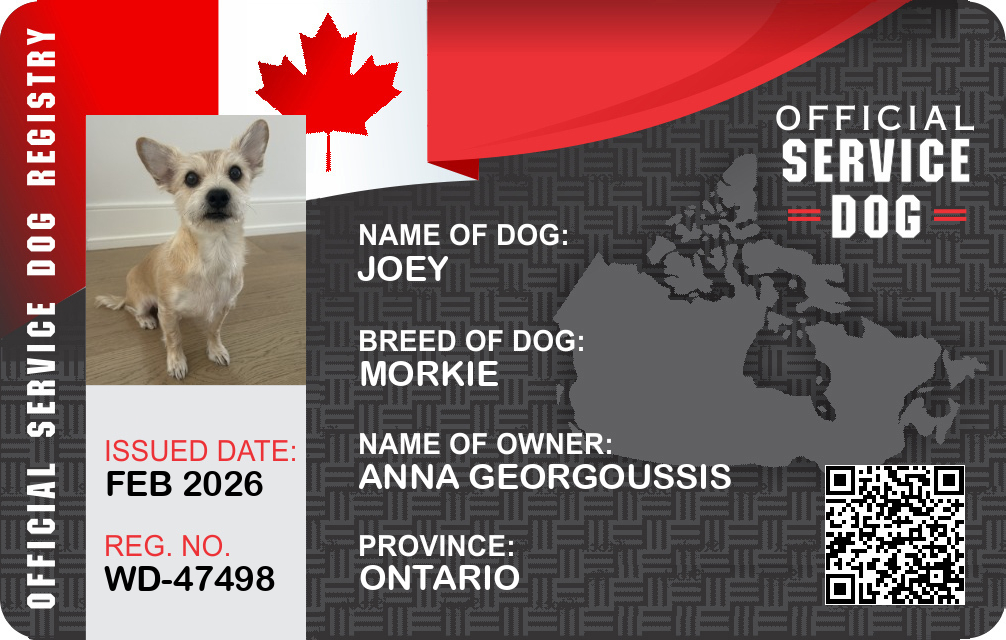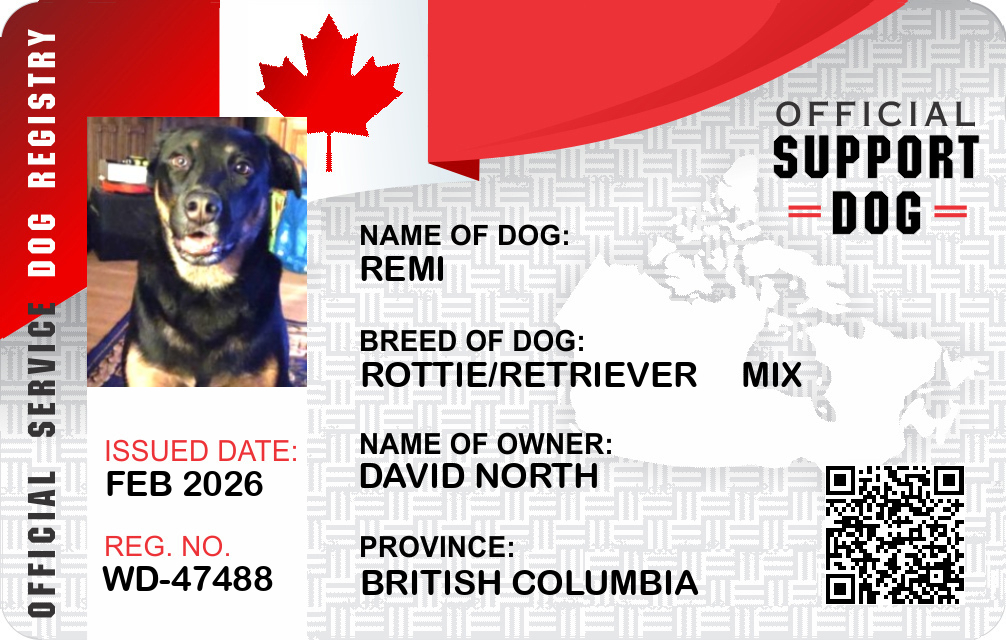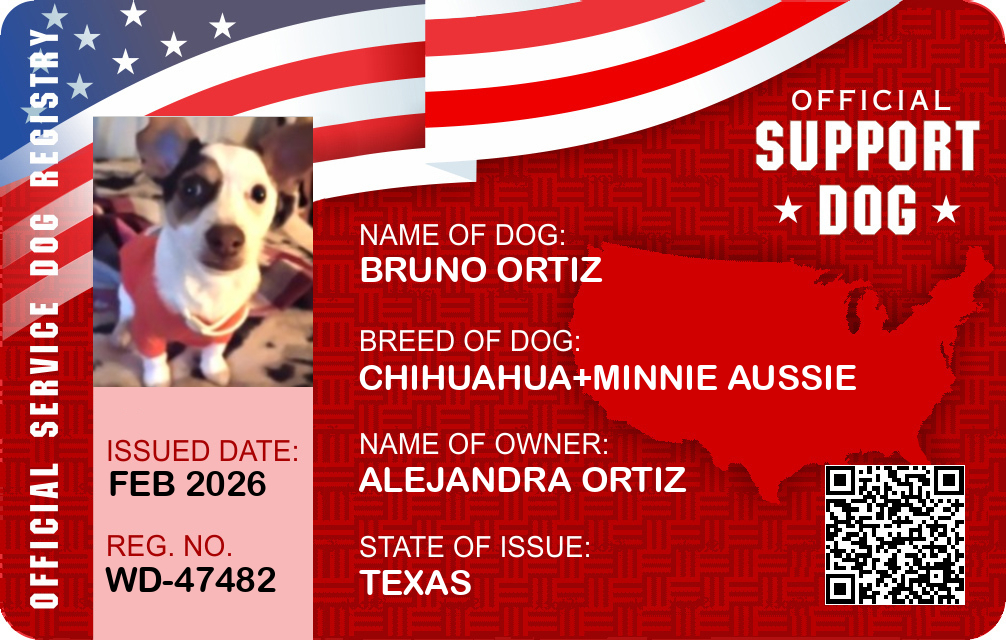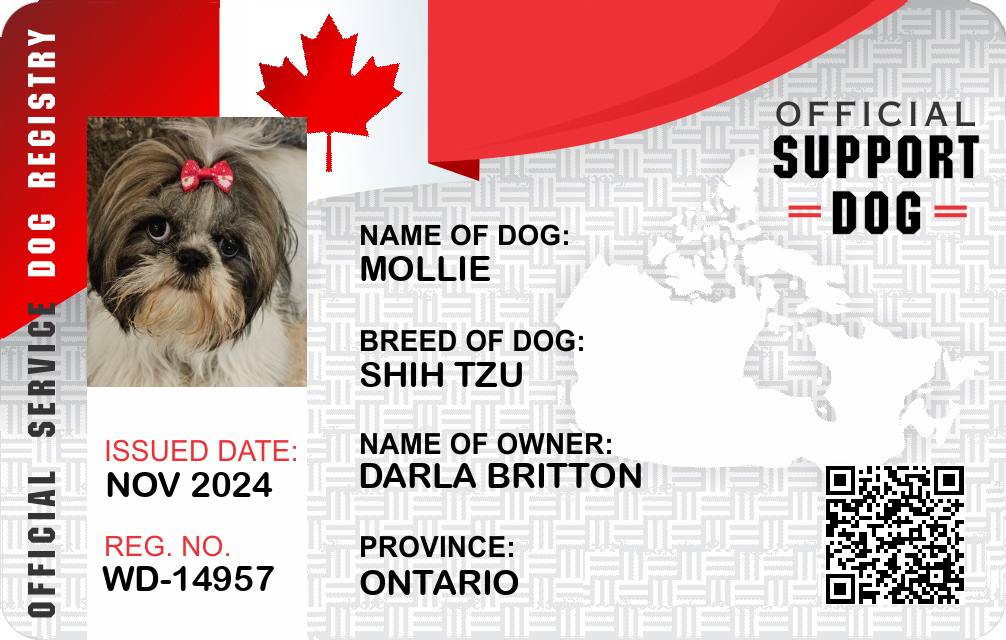South Dakota Emotional Support Animal Laws
Get Your Documents
Example State Cards


Overview of ESA and Legal Definitions in South Dakota
In South Dakota, as in the rest of the United States, Emotional Support Animals (ESA) play a vital role in providing emotional and psychological benefits to individuals with disabilities. However, ESA are distinct from service animals, and understanding these differences is crucial for both ESA owners and those who interact with them.
What is an Emotional Support Animal?
An Emotional Support Animal (ESA) is an animal that provides comfort and support to individuals with emotional or mental health disorders. Unlike service animals, ESA are not required to perform specific tasks related to a disability. Their primary role is to alleviate emotional distress, such as anxiety or depression. In South Dakota, like elsewhere, ESA can be any type of animal, although dogs and cats are the most common.
How ESA Differ from Service Animals
Service animals, as defined by the Americans with Disabilities Act (ADA), are trained to perform specific tasks for individuals with disabilities. These tasks are related directly to the person’s disability, such as guiding someone who is visually impaired or alerting others to a medical emergency. In contrast, ESA do not require specialized training. Consequently, ESA do not have the same level of public access rights as service animals. While service animals are permitted in all public areas, ESA have more limited accommodations under the law.
Key Federal Laws Affecting ESA (e.g., FHA, ACAA)
Two primary federal laws impact the rights of ESA owners: the Fair Housing Act (FHA) and the Air Carrier Access Act (ACAA). The FHA requires housing providers to make reasonable accommodations for individuals with disabilities, including those with ESA, in housing situations. The ACAA previously ensured that ESA could accompany their owners in airplane cabins, but recent changes now recognize only service animals as having guaranteed access on flights.
State-Specific ESA Laws in South Dakota
While federal laws provide a framework for ESA rights, South Dakota adheres to these laws without significant additional state-specific legislation for ESA. However, understanding how these federal laws apply within the state is crucial for ESA owners.
Housing Rights and Responsibilities
Under the FHA, individuals in South Dakota have the right to live with their ESA, even in housing with a “no pets” policy. Landlords are required to make reasonable accommodations, provided the tenant has an ESA letter from a qualified healthcare provider. Importantly, landlords cannot charge pet fees for ESA. However, they can hold tenants responsible for any damages caused by the animal. Housing providers may request documentation proving the need for an ESA but cannot inquire about personal medical details.
Public Access and Accommodation
Unlike service animals, ESA in South Dakota do not have the right to accompany their owners in all public spaces. Businesses and public entities are not required to admit ESA, as ESA do not meet the ADA’s definition of a service animal. Therefore, entry is at the discretion of the individual business or public entity, and ESA owners must respect these boundaries.
Transportation and Travel Rules
Following recent amendments to the ACAA, ESA no longer have guaranteed access to the cabin of airplanes. Airlines operating in and out of South Dakota now categorize ESA as pets, subjecting them to standard pet travel policies and fees. ESA owners should check with specific airlines regarding their policies well in advance of travel.
Employment and Workplace Considerations
While ESA are not recognized in South Dakota as service animals in the workplace, some employers may voluntarily provide accommodations. The Equal Employment Opportunity Commission (EEOC) guidelines suggest that employers must consider requests for reasonable accommodations for employees with disabilities, which could include allowing an ESA. It is essential for ESA owners to communicate openly with their employers, providing documentation that establishes the necessity of their ESA in the workplace.
Documentation, Requirements, and Processes in South Dakota
To ensure compliance with ESA laws in South Dakota, owners must have appropriate documentation and understand the processes involved.
ESA Letters and Who Can Issue Them
For an animal to be recognized as an ESA, the owner must possess a valid ESA letter from a licensed mental health professional. This can include psychologists, psychiatrists, licensed clinical social workers, or other qualified professionals who can assess the individual’s mental health needs. The letter must be current (typically renewed annually) and should detail how the ESA helps alleviate symptoms of the condition.
Registration, Certifications, and Common Misconceptions
Unlike service animals, ESA do not require formal registration or certification. Various websites offer ESA “certifications” or “registration” for a fee, but these are not necessary nor recognized legally. What matters is a legitimate ESA letter from a qualified healthcare provider.
Landlord, Business, and Provider Verification Rules
When requesting accommodations, whether in housing or employment, landlords and employers in South Dakota may ask for an ESA letter but cannot request detailed medical records. They also cannot charge additional fees for the animal. It’s advisable for ESA owners to keep a copy of their ESA letter readily available to furnish when necessary.
Rights, Limitations, and Legal Risks
Understanding the scope of rights and limitations for ESA in South Dakota will help ESA owners navigate potential legal pitfalls.
Rights ESA Owners Have in South Dakota
- Housing: ESA are permitted in housing with provisions for reasonable accommodation under the FHA.
- Employment: Employers may provide accommodations voluntarily but are not required by law.
Limits on ESA Protections and Common Restrictions
- Public Access: ESA are not entitled to enter public places where pets are generally prohibited.
- Air Travel: Airlines may classify ESA as pets, with associated travel restrictions and fees.
- Fees and Damages: While no pet fees can be charged, owners are liable for damages caused by their ESA.
Penalties for Fraud or Misrepresentation
South Dakota imposes penalties for falsely claiming an animal as a service animal. Such actions can undermine the credibility of legitimate ESA needs and result in legal repercussions.
Practical Guidance for ESA Owners in South Dakota
Navigating ESA laws requires proactive steps and clear communication with relevant authorities and entities.
How to Qualify for an ESA Legitimately
To qualify for an ESA, an individual must have a diagnosed mental health condition and obtain an ESA letter from a licensed mental health professional. The letter must substantiate the therapeutic benefits of the animal in alleviating specific symptoms.
How to Talk to Landlords, Airlines, and Employers
- Prepare: Have your ESA documentation ready and be clear about your needs.
- Communicate: Be upfront about your ESA requirements and follow up in writing if necessary.
- Negotiate: Understand your rights and be prepared to find a compromise if initial requests are denied.
Summary of ESA Laws in South Dakota
In summary, ESA laws in South Dakota provide specific rights primarily in housing, with limited accommodations in public access and travel.
- Rights:
- Housing under the FHA
- Potential workplace accommodations
- Limitations:
- No public access rights
- Subject to airline pet policies
- Documentation Needed: Valid ESA letter from a licensed professional
- Cautions: Avoid fraudulent claims and prepare for responsible ESA ownership to maintain legal compliance and positive relations.
Get Your Documents
Example State Cards













